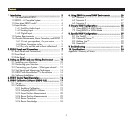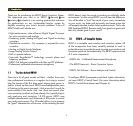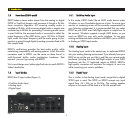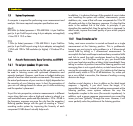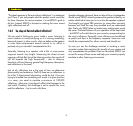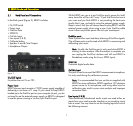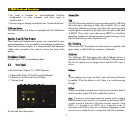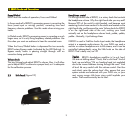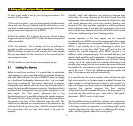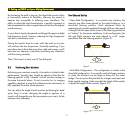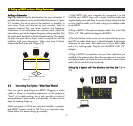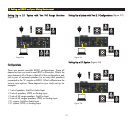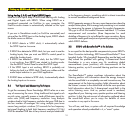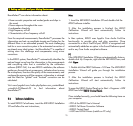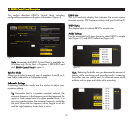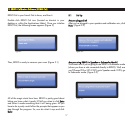
10
It’s time to get ready to set up your mixing environment. This
consists of 3 easy steps:
1) Set up your monitors - you may have already put them exactly
where you want them, but please read the next section as you
may learn something about monitor positioning that will ensure
you get maximum enjoyment out of ERGO.
2) Hook up cables - this is always fun as you will get to plug
things into and out of your ERGO. Follow the directions and you
will be rewarded.
3) Run the software - this is always not fun, as software is
typically horrible and causes all kinds of headaches. Thankfully,
ERGO’s software is simple to install and use, but it does require
that you pay attention to the instructions in this manual and on
your computer screen.
OK, let’s make sure your monitors are properly set up!
33..11 IInnssttaalllliinngg YYoouurr MMoonniittoorrss
Before
to install your monitors, it is a good idea to understand
what happens in your room depending on speaker placement
and other tidbits like that. You see, with ERGO, there’s a change
up in traditional loudspeaker placement rules – you can break
away from conventional “free space” placement. In general,
loudspeakers are placed well away from rear and side walls to
secure the best possible frequency response. Considering that a
traditional box loudspeaker has omnipolar dispersion in the
bass region, this “free space” placement has a big
disadvantage since it is possible to destroy the impulse response.
The reason for this is that you hear both the direct sound from
the speaker and later all the reflections from the walls. The
reflections are delayed as a consequence of the distance to the
walls and will end up arriving later...think the smeared “attack”
of a snare drum that you may have heard in the past, for
example.
33.. SSeettttiinngg uupp EERRGGOO aanndd yyoouurr MMiixxiinngg EEnnvviirroonnmmeenntt
Typ
ically, back wall reflections are annoying because they
arrive from the same direction as the direct sound from the
loudspeaker. Side wall reflections are easier for the brain to cope
with simply because they arrive from another direction and
because of this, they are often regarded as adding ambience
and localization clues. If you place the loudspeaker close to the
back wall, the bass reflections from the wall and the direct sound
will arrive simultaneously at your listening position.
Impulse response in the bass region can be improved
considerably since ERGO can easily compensate for the uneven
frequency response as a consequence of the placement. With
ERGO, it can actually be to your advantage to place your
loudspeaker in a less than ideal “close wall” spot as this will
improve the impulse response while ERGO corrects it. In
addition, when compensating for the increased efficiency, the
load on both amplifier and loudspeaker is decreased meaning
that less distortion and better headroom are achieved. Taking
energy out of the system also has another advantage since
pumping less energy into the room means that room modes are
less excited. So, you achieve a much more even power response
across the room – That is the differences between peaks and
dips in the response are reduced dramatically.
In a case like this, the room correction index will also be quite
high since correction in the bass region is needed. However, the
index number is not high because you have a “poor system” it’s
high just because you have chosen a loudspeaker position that
improves the impulse response but then requires
compensation for the increased efficiency in the bass region. Try
it out and see what works for you – near wall or “free space”
placement – ERGO works in both cases.
The close-field monitor, by definition, reduces room interaction.
This can be compared to the conventional stereo configuration
or the large monitor arrangement in a recording studio where
sounds emanating from the monitor or reflecting off ceilings,
walls, and floors greatly affect the sound quality.



